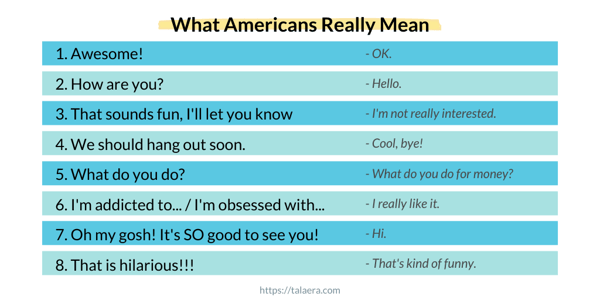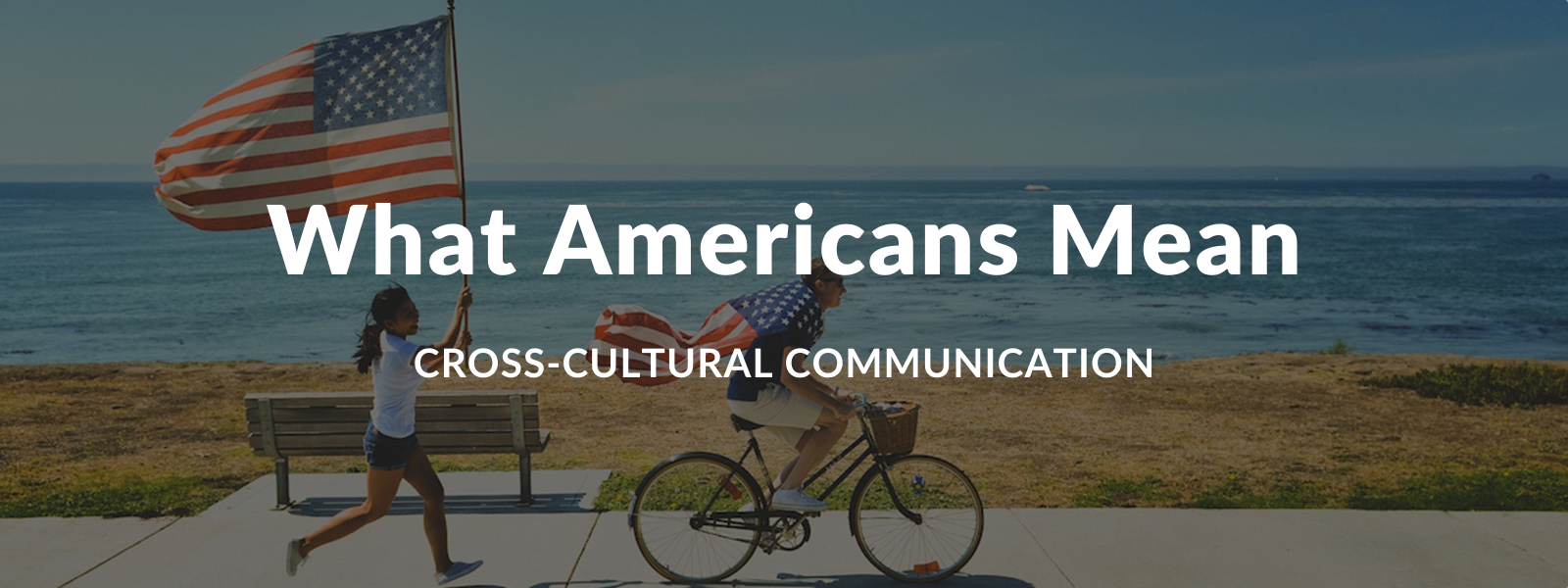By Neya Abdi on Jan 18, 2021 5:18:00 PM
You can have all the dictionaries, phrasebooks, and apps in the world and still have no clue what someone really means. Once you’ve mastered English grammar and vocabulary, the new challenge is understanding the coded meanings behind English expressions. Oftentimes, the meaning of certain expressions will change based on the context, tone, and culture. Cross-cultural communication struggles are a source of frustration, hindered productivity, and poor team work. But there are ways to thrive in a multicultural workplace.
If you work with people from the United States, make sure you check out our podcast 7 Tips On How To Communicate Better With US Americans. In this post, you will find a starter pack to help you decipher what Americans really mean during casual conversation. (Note: This list basically applies to Canadians, too.)
Common English expressions and what Americans actually mean

1. What Americans mean when they say, 'Awesome!'
You will hear this word everywhere. It crops up in texts, emails, and face-to-face conversations. The textbook definition is, “extremely impressive or daunting; inspiring awe”, but people really just use it to acknowledge that someone has done something that is pretty straightforward, neither impressive nor awe-inspiring, and probably their job.
Example:
Person 1: Your appointment is booked for Tuesday at 3. We’ll see you then.
Person 2: Awesome! Thanks so much.
2. What Americans mean when they ask, 'How are you?'
All this means is “hello”. It's phrasing as a question and the reference to “you” all suggest that the asker wants to know about your physical health and emotional well-being, but unless they are your significant other or doctor, all they want to hear in return are the words, “I’m good, how are you?”
Example:
Marguerite spilled coffee on her laptop this morning. She was reprimanded by her boss for a mistake someone else made, and her doctor just diagnosed her with irritable bowel syndrome. Marguerite is NOT having a good day. She runs into a friend from college on the way home from work.
Patricia: Hey! It’s me, Patricia, from NYU. How are you?
Marguerite: “Good, good! How are you?”
Patricia: Not bad. Keeping busy.
End scene.
3. What Americans mean when they say, 'That sounds fun. I'll let you know'
A very common response to an invitation to do something. Now, depending on the relationship this may be an honest indication that the person will check their calendar to see if they are available. But more often than not, said person does not feel like participating and they are a) planning to say they can’t come via text or b) going to avoid an outright “no” in case they later learn your event will be more fun than they expected.
Example:
Employee A: I’m having some people over for my birthday on Saturday night. Would love it if you could come.
Employee B: That sounds like fun! I’ll definitely let you know.
4. What Americans mean when they say, 'We should hang out soon'
“To hang out” simply means “to spend time” together. People will say, “I was hanging out with Philip.” or “I finish work early on Friday. Want to hang out after?”
But when there’s no reference to a specific date or time, it’s a way to end a quick conversation with someone you used to be friendly with, but haven’t seen in a long time. (Honest disclosure: they probably don't actually mean that they want to see you anytime soon.)
Example:
Person 1: Wow, well it was nice running into you. I can’t believe we haven’t seen each other since college.
Person 2: I know, it’s been forever! I’ve got to run, but we should definitely hang out sometime soon.”
5. What Americans mean when they ask, 'What do you do?'
This question isn’t about what you do for your family or what you do to make your skin so clear. This is about what you do for money.
It is not considered a rude question to ask a stranger. In fact, it is considered an extremely safe icebreaker.
Example:
Harry: Nice to meet you, Tim. So what do you do?
Tim: I’m a senior account manager for a shipping company. How about you?
6. What Americans mean when they say, 'I'm addicted to...' or 'I'm obsessed with...'
These expressions do not imply that the speaker has a life-wrecking substance abuse problem, but all it means is that they love something very, very much.
Example:
Melanie: Do you like Chipotle?
Katrina: I’m addicted to Chipotle. I have it, like, every day for lunch and dinner.
7. What Americans mean when they say, 'Oh my gosh! It's SO good to see you!'
Translation: Hi.
8. What Americans mean when they say, 'That is hilarious!!!'
Translation: That's kind of funny, but not anywhere close to making me laugh out loud.
Keep improving your cross-cultural communication
When you are at a table with people from different cultures speaking in English, it's hard to join the conversation. Find your voice in English, improve your cross-cultural competencies, and increase your CQ (Cultural Intelligence). Start by learning how to ask better questions in cross-cultural workplaces and join communication webinars where you can learn how to better work across cultures.
You may also learn about different communication styles in different cultures. Listen to our culture series on our podcast, Talaera Talks, and learn how to communicate effectively with people from different cultures:
- 🇮🇳 India
- 🇩🇪 Germany
- 🇮🇱 Israel
- 🇺🇸 United States
- 🌎 Managing Across Cultures
If you are ready to take your communication skills to the next level, join one of Talaera's business English courses. Whether you work in 1:1 sessions, group courses, workshops, or webinars, we will create a program tailored to your needs and match you with the perfect teacher for you.
For any additional information or questions, you can also reach out at hello@talaera.com. Interested in getting the best offers and receiving free content on Business English communication? Subscribe to our newsletter and we will keep you in the loop with offers, free events, and development materials!
If you enjoyed this article, keep reading:
- 7 Tips On How To Communicate Better With US Americans [Podcast]
- 'Stay safe' - How to Send Actually Genuine Emails During the Pandemic
- Useful Answers to Business English Top Questions - Expert Advice
- How To Learn The Difference Between 'Really' And 'Very'?
- 150+ Useful Email Phrases That Will Make Your Life Easier
- 14 Simple Rules That Will Make You A Better Communicator
- Learning Business English? +20 Top Tips You Need To Know
[Blog Article Originally Posted on May 5, 2017. Podcast episode released in August, 2022.]



comments